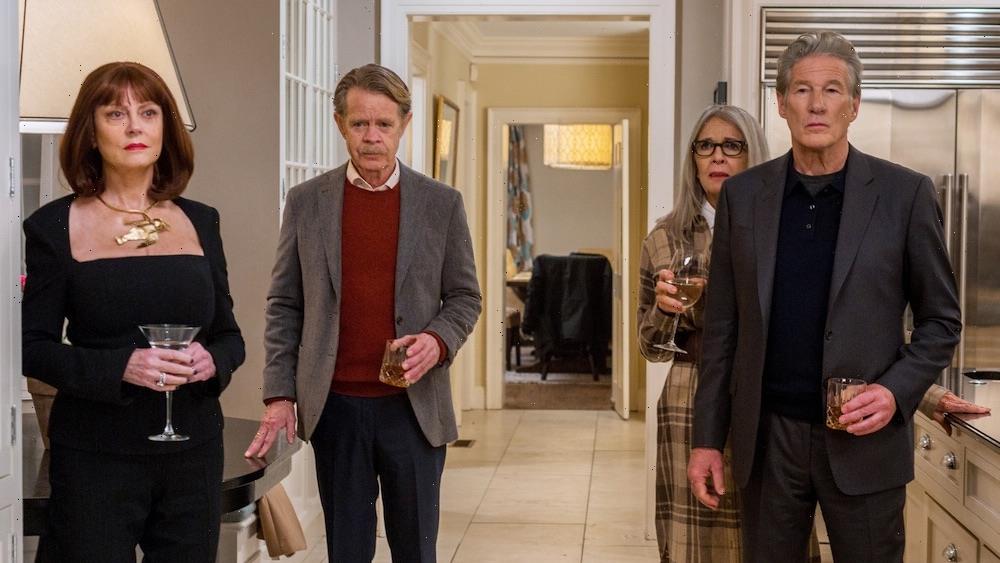Even if you walked into “Maybe I Do” knowing nothing about its pre-production provenance, it likely would not take long for you to discern, from the clockwork pacing, punchline-littered dialogue and frequent proscenium-arch framing, that this formulaic but fitfully entertaining trifle is based on a stage play. Indeed, for those viewers who recall the heyday of celebrity-driven dinner theater, the film may spark memories of wolfing down prime rib and knocking back mixed drinks before chuckling at the antics of aging and/or under-employed film and TV stars in everything from comedies by Neil Simon (or Neil Simon wannabes) to Broadway flops that enjoyed extended afterlives in the hinterland.
As it turns out, writer-director Michael Jacobs based “Maybe I Do” on his own “Cheaters,” a comedy that lasted scarcely a month on Broadway in 1978, and was most notable at the time for being the work of a playwright who was then only 22 years old. (In this interest of full disclosure: I was in New York during the play’s fleeting run, but when I read one of the less-than-charitable reviews, I decided: “No, I don’t think so.”) During subsequent years, Jacobs — who has enjoyed much greater success as writer/creator of the sitcom “Boy Meets World” — periodically revised his script for regional revivals, including a 2019 run at Sacramento’s Ooley Theatre. And now it is a movie, of sorts.
I can’t say with certainty that the original material has been greatly improved over the decades, but I suspect that this current iteration has advanced the ages of the lead characters, and given those people and their concerns more dramatic weight. That might explain how Jacobs was able to land four seasoned stars — Diane Keaton (who also serves as an executive producer), Richard Gere, Susan Sarandon and William H. Macy — for “Maybe I Do.” They in turn make the movie a lot funnier, and a great deal more compelling, than it might have otherwise been. But give the playwright/filmmaker some credit: Beneath the easy laughs and arrant contrivances, Jacobs has planted some affectingly melancholy observations about the anxieties of well-to-do but discontent sixtysomethings facing the immutable reality that, as one character puts it, “More life has gone by than what you’ve got left.”
For the long-married Howard (Gere), extracurricular activities evidently seemed, at first, to be a viable method for jumpstarting his stalled life. After a four-month fling with the equally long-married Monica (Sarandon), however, he reconsiders his options. When we first see them in a luxurious New York hotel room, she does her best to arouse, ahem, his interest: “I’m naked under this.” His mildly annoyed response: “I’ll take that under advisement.” What we’re seeing, of course, is the end of the affair. And while the sharp-tongued and utterly humiliated Monica threatens to kill her ex-paramour at some future date, neither Howard, nor the audience, takes her seriously.
Meanwhile, over at a Manhattan art-house cinema, Sam (William H. Macy) weeps while watching a black-and-white Scandanavian drama, and identifying a tad too much with the lead character’s inconsolable ennui. The crying attracts the attention of another moviegoer, Grace (Keaton), who offers consolation and, later, conversation. Each is stuck in a decades-long marriage to a partner who no longer provides either expressions of love or reassuring companionship. But even though they eventually check into a sleazy hotel together, all they do is talk. And then they go for a walk, and talk some more. In fact, they spend the entire evening talking, because even for the semi-religious Grace, adultery is a bridge too far. When they part, however, each seems at least marginally happier for their brief encounter.
And over at a wedding in a ritzy hotel: Allen (Luke Bracey) impulsively grabs the bouquet thrown by the bride because — well, though he’s loath to admit it, he didn’t want Michelle (Emma Roberts), his live-in girlfriend, to seize the flowers as firepower in her campaign for him to put a ring on it. Allen loves her, no doubt, but he’s commitment-phobic, fearing that love has a short shelf-life, and they might someday regret moving on to meet, and marry, other people. Not surprisingly, none of this goes over well with Michelle, who’s ready to run the risk and “jump off the cliff” with Allen. So she goes home to her parents, and he goes home to his.
All of this unfolds during intercut scenes in the movie’s leisurely paced first half hour, and only people who have never seen another movie in their lives will be surprised when it’s revealed that, yes, Howard and Grace are the married parents of Michelle, while Sam and Monica are the married parents of Allen. Things continue to proceed with comparable predictably, leading to a gathering of the three couples for an at-home dinner that triggers shocked reactions, nervous conversations, aired grievances and on and on.
To be fair: “Maybe I Do” is undemanding, painless and pleasantly diverting, and has the saving grace of never trying too hard for a cheap laugh. There are quite a few undeniably funny lines, many of them made all the more amusing by the perfect-pitch delivery of the pros in the cast. When someone asks Macy’s Sam if he’s happy, he responds with hangdog honesty: “I’m as happy as I’m going to get.” The line may not look much in print, but Macy makes it both richly amusing and potently revealing. On a more serious note: Allen, worried about their long-range prospects, references his parents when asking Michelle, “What happens to us on the way to them?” He may not be entirely aware of the connections between “them.” But his point is well taken, even though Michelle rebuffs it.
In short, the actors here — especially the four AARP-appropriate stars — give “Maybe I Do” more than it gives them. But they get just enough to give performances that are considerably more substantial and satisfying than routine funny business.
Read More About:
Source: Read Full Article
